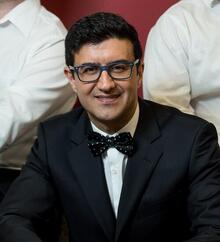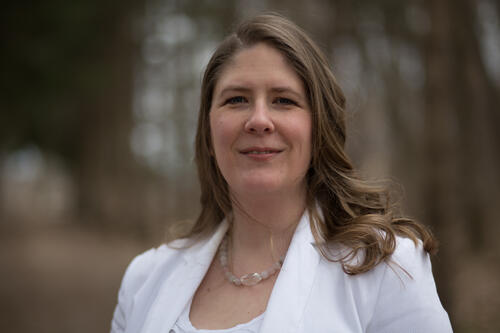
Waterloo alumni support essential workers
In the midst of a global pandemic, Waterloo alumni are looking to care for the people who keep society safe and healthy

In the midst of a global pandemic, Waterloo alumni are looking to care for the people who keep society safe and healthy
By Megan Vander Woude Office of AdvancementSometimes, the most difficult times create the best opportunities for impact. In the midst of a global crisis, we’ve heard from dozens of alumni who shared their efforts to support essential workers.
While it can be difficult to capture all of the amazing work Waterloo’s alumni is doing in the face of COVID-19, here are a few of their stories.
 Twelve years ago, Shahram Yousefi (PhD ’02) suffered a near-death experience as a result of a medical error. That, it turns out, did not bring out anger. It simply drove his engineering problem-solving passion. Driven to find the root cause, he began studying healthcare efficiency and in particular provider fatigue and burnout. This led to a healthcare scheduling and communication platform called Mesh AI. Launched in June 2018, the platform helps take care of medical professionals by creating a schedule that accounts for a hospital’s staffing needs, as well as the personal needs of individual care providers.
Twelve years ago, Shahram Yousefi (PhD ’02) suffered a near-death experience as a result of a medical error. That, it turns out, did not bring out anger. It simply drove his engineering problem-solving passion. Driven to find the root cause, he began studying healthcare efficiency and in particular provider fatigue and burnout. This led to a healthcare scheduling and communication platform called Mesh AI. Launched in June 2018, the platform helps take care of medical professionals by creating a schedule that accounts for a hospital’s staffing needs, as well as the personal needs of individual care providers.
“Currently, many hospitals and clinics are using our platform for their so-called COVID-19 teams,” Shahram says. “These schedules need to be created very quickly and they need to be very agile. So, if one provider needs to be quarantined or if they’re fatigued or need to care for a family member with COVID-19, the system can find someone to replace them in one click.”
In March, as the pandemic was spreading across the globe, Shahram and his team began offering Mesh AI for free.
“As Canadians who are very proud of our healthcare system, we wanted our platform to be democratized,” he explains. “The platform democratizes staff scheduling both in terms of how the shift planning process is and also who can afford it. With that in mind, it only made sense to remove the subscription fees entirely during the COVID-19 crisis.”
More than anything, Shahram believes that if healthcare providers are properly looked after, their ability to treat other patients will also be better.
“These are people with lives and families and personal obligations – it is time we turned our attention to the health and wellbeing of those who save others’ lives day in, day out.”
Elizabeth Monier-Williams (BA ’01) is a marketer at Think Research, a healthcare technology company that provides standardized care plans for hospitals and long-term care facilities. They also offer a platform that allows patients to remotely connect with doctors.
Since the global pandemic began, Elizabeth’s day-to-day job has had a clear impact on supporting those treating and preventing the spread of COVID-19.
“While there isn’t a lot of new, specific evidence for COVID-19 just yet, there is a lot of evidence about how to treat pneumonia or febrile respiratory disorders, which have similar symptoms,” she explains. “Our team is working to reach people who don’t know about this content and give clarity about how they can use it to help protect people.”

Photo credit: Tara van Leerdam
The content is particularly useful in retirement and long-term care homes, where staff are trying to manage patient care and files, screen visitors and make critical decisions about when to transfer patients to the hospital.
Standardized information and virtual screenings offer valuable information to nurses, doctors and personal support workers who are juggling a plethora of tasks and dealing with an unfamiliar disease. The more support they have in their decision making and day-to-day care, the easier it is for them to keep patients comfortable and decrease their exposure. The care plans can also prevent patients from being sent to the hospital unnecessarily, which relieves pressure from emergency rooms.
As a marketer, Elizabeth never expected to play such an impactful role in the health care system, or patients’ lives.
“I don’t have a medical degree. I’m notoriously squeamish. But this is a small way to do my part,” she says. “Our tools support the people on the front lines who are doing such important work to keep us all safe.”
When Theresa Schumilas (MSc ’85, PhD ’15) founded Open Food Network Canada (OFN), she wanted to create a system for local food providers and buyers. With OFN’s platform, individuals, businesses or organizations can create their own online storefront and online farmers markets, where orders are organized, packaged and delivered by a collective of producers. During a crisis like the COVID-19 pandemic, this system allows independent producers to continue selling their products while practicing physical distancing.

“A lot of farmers, artisans and suppliers have had their markets or supply chains impacted,” Theresa says. “Right now, many local farmers are just starting their growing season. They are planting as usual and hoping their will be distribution networks for their products when they harvest.”
With OFN, these farmers can grow their crops with the knowledge that they’ll have a place to sell their final products – even if physical distancing is still in place.
To make the platform more accessible, OFN is offering their e-commerce tools free of charge for the next three months. This will allow suppliers the opportunity to set up their own online store and online farmers markets by collaborating with other suppliers in their area. It’s a system that works well during the world’s current crisis, but it also makes sense when communities return to normal life.
“It’s about developing collective online markets and buying clubs in addition to the individual storefronts,” Theresa explains. “It’s building a resilient system.”

Read more
More than 20 founders from Waterloo highlight the newly unveiled list that celebrates those making the biggest impact inside Canadian tech and innovation

Read more
The Kitchener-Waterloo Oktoberfest Rogers Women of the Year awards recognize leaders for outstanding community contributions

Read more
Velocity and Socratica’s builder communities help Waterloo students find their people and build their entrepreneurship side
The University of Waterloo acknowledges that much of our work takes place on the traditional territory of the Neutral, Anishinaabeg, and Haudenosaunee peoples. Our main campus is situated on the Haldimand Tract, the land granted to the Six Nations that includes six miles on each side of the Grand River. Our active work toward reconciliation takes place across our campuses through research, learning, teaching, and community building, and is co-ordinated within the Office of Indigenous Relations.